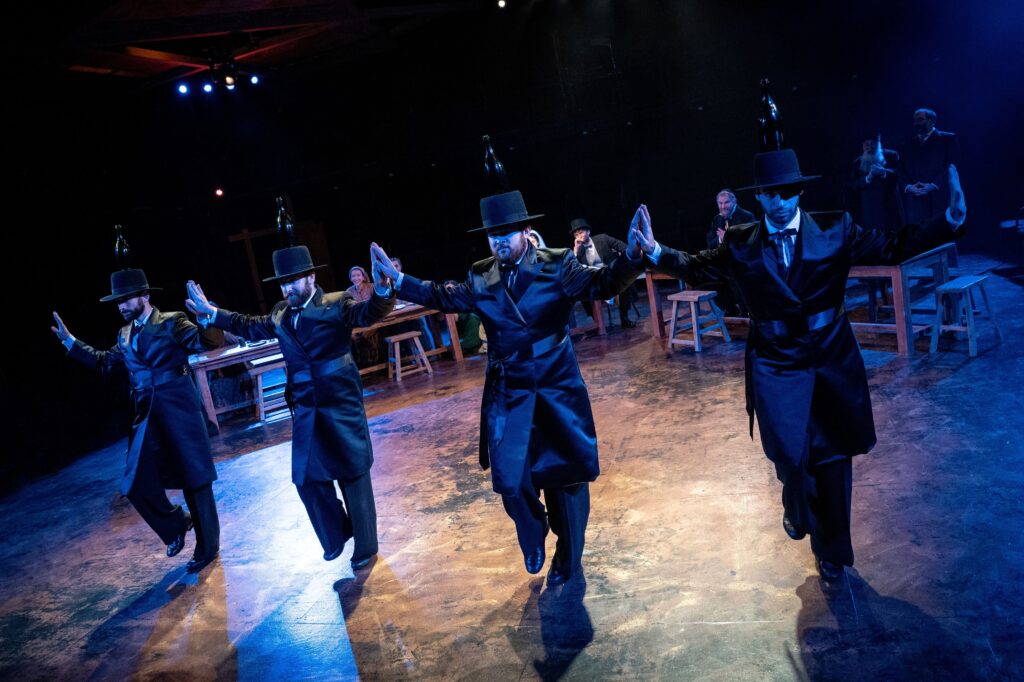Yes, we’re all waiting for the men to dance with bottles on their heads, which is especially riveting because many of us are sitting close enough to catch one should it plummet. In fact, one did the night I saw it, making the feat all the more impressive by proving there’s no Velcro.
Yes, we’re all waiting for the men to dance with bottles on their heads, which is especially riveting because many of us are sitting close enough to catch one should it plummet. In fact, one did the night I saw it, making the feat all the more impressive by proving there’s no Velcro.
Equally fruitful is the way Signature Theatre’s first-ever production of “Fiddler on the Roof,” with the audience on all sides and only a few rows deep, turns that intimacy into poignancy. The early-1900s Russian-Jewish villagers sing the opening number, “Tradition,” while arranged around a large table whose wooden pieces will gradually shift and fragment throughout along with the community itself. The brown and beige in Misha Kachman’s set is interrupted by pops of color from paintings above us (inspired by the ceilings of Eastern European synagogues), and surprise appearances by flowers that highlight moments of hope amid the poverty and persecution.
It’s admirable how smoothly “Fiddler” accommodates this concept from director Joe Calarco. Even without backdrops, the town of Anatevka simply unfolds before us. The production echoes Signature’s recent, similarly semi-immersive staging of “In the Heights,” a show partly inspired by “Fiddler” in its conjuring of a place with its own rituals, gossip, love stories and a threatened way of life.
The movement in “Fiddler” is already so well-integrated into the storytelling, a hallmark of original director Jerome Robbins. The comedic horror song “Tevye’s Dream” moves the narrative forward in a way that only musical theater can, and feels all the more enveloping here. When the bar erupts with Sarah Parker’s choreography during the engagement celebration “To Life,” it didn’t even occur to me that they might not be doing that if the scene were in real life.
It helps that the musical by Joseph Stein, Jerry Bock and Sheldon Harnick, adapted from the stories of Sholem Aleichem, tells such a seamless narrative of Tevye (Douglas Sills of Broadway’s “The Scarlet Pimpernel” and TV’s “The Gilded Age”) and Golde (Amie Bermowitz) burdened with arranging husbands for their daughters (Beatrice Owens, Lily Burka, Rosie Jo Neddy), who rebel with varied religiously inconvenient plans of their own. It’s been time-tested through 3,242 performances of the original 1964 production, a movie that earned eight Oscar nominations and such universal recognition that a producer in Japan once famously asked whether they understand the show in America “because it’s so Japanese.” The songs are like emotional Russian roulette — which one will make you cry this time?
In recent decades, New York saw David Leveaux’s muted 2004 production starring Alfred Molina, which lacked the heart of Bartlett Sher’s 2015 revival starring Danny Burstein and the Joel Grey-directed 2018 Yiddish-language version. Locally, Olney Theatre Center’s 2023 production had a framing device where “émigrés in the garb of many cultures mill about in a Kafkaesque waiting room” along with a post-Anatevka Tevye, who gathers them all to reenact the story, as Celia Wren wrote in a critical Post review.
Sills’s Tevye here is irritable but mostly a mensch. In “If I Were a Rich Man,” he yearns for a day when others in town would ask his advice, “posing problems that would cross a rabbi’s eyes,” and we indeed see the town’s comically bumbling rabbi (a pitch-perfect Christopher Bloch) stand slack-jawed when confronted with a quandary. Tevye will, in fact, face such problems head on — and Sills revels in declaring his verdicts.
I’ve always been struck by the way we see Tevye become (to some extent) the town wiseman he thinks he can never be. “And it won’t make one bit of a difference if I answer right or wrong — when you’re rich they think you really know,” he adds — and yet his answers do make a difference. He’s a struggling, wisecracking dairyman who repeatedly misquotes “the good book,” yet through just enough open-mindedness and emotional intelligence (aided by a wry, unilateral friendship with God) he helps his people adapt their traditions to a changing world.
His daughters are, of course, the ones making the real push, under threat of forced marriage, expressed here in an exhilarating “Matchmaker, Matchmaker.” (“Fiddler” absorbed aspects of the cultural moment, coming out a year after “The Feminine Mystique.”) The suitor Motel (Jake Loewenthal) is anxiously amusing without looking like he’s trying too hard, which is basically the job, and the overeager teacher and revolutionary Perchik (Ariel Neydavoud) is a tad over-overeager but still charmingly passionate. (Communism jokes — they still work.)
Not all of the moments hit. Tevye’s climactic confrontation with daughter Chava starts out lovely but ends a bit mired in stage business. I didn’t quite feel the tenuous but cordial relationship between Tevye and the Constable (Davis Wood), which can help reveal the patriarch’s tolerant streak. Occasional moments feel rushed, without enough sense of import that lives are about to change.
But by the end, as the villagers pooh-pooh their own village to cope with its demise (“a stick of wood, a piece of cloth”), the show has dramatized the dignity of humble places and people. Wooden slabs can become a gathering spot. Beauty can be found in a bouquet that emerges from the dusty landscape. And meaningful answers to life’s questions often come not from texts or authorities, but from what we feel when we look at our daughter and wish only for their happiness.
The post A ‘Fiddler on the Roof’ where everyone else in the audience can see you cry
appeared first on Washington Post.




